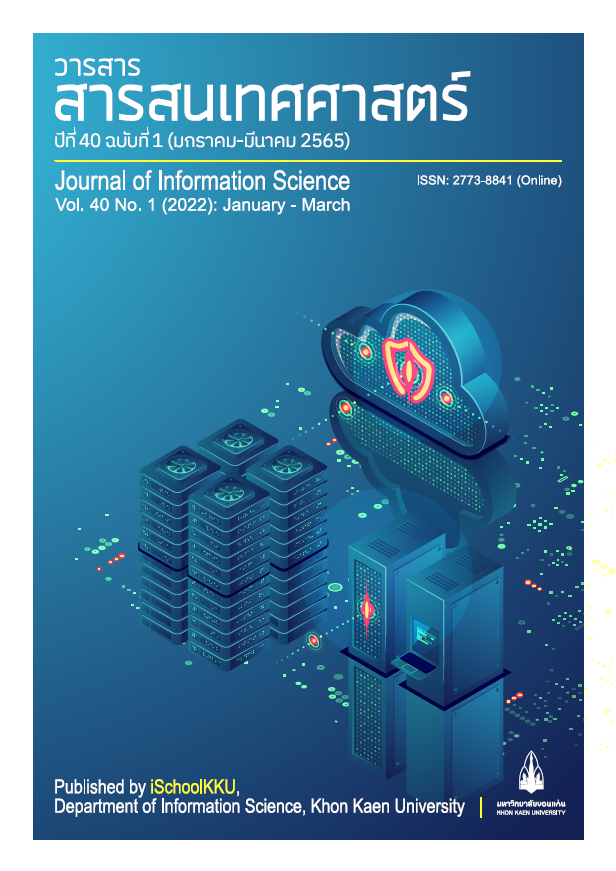The Effect of Digital Literacy Training Program on Sustainable Natural Resources and Environmental Management for Seventh Grade Students at Srikranuanwittayakom School in Khon Kaen Province
DOI:
https://doi.org/10.14456/jiskku.2022.3Keywords:
Digital Literacy, Digital Literacy Skills, Digital Intelligence, Natural Resources Management, Environmental ManagementAbstract
Purpose: This research explores the digital literacy skills for management of sustainable natural resources and environment of the secondary school students at Srikranuanwittayakom School, Kranuan District, Khon Kaen Province.
Methodology: This quantitative study employed questionnaires to collect data from 100 Matayom one (7th grade) students who participated in the workshop for creating youth volunteer for natural resources and environment conservation of Kranuan District. After the workshop, these respondents participated in the integrated community based instruction and undertook field practicum where they collected data on the community natural resources and environment through the management system approach. Analysis of the data was conducted using basic statistics and paired sample t-test.
Findings: The analysis of the data revealed that majority of the participants possessed the digital literacy skills at the moderate level; and it was noted that after the integrated community based learning, their literacy skills increased from 12% to 20%. When comparing these skills with those for sustainable natural resource and environment management, it was found that their literacy scores significantly varied at 0.01. This indicates that integration of research into the instruction and integrated community based learning process enable students to acquire more 21st century learning skills through the virtual learning. Therefore, information literacy skills should be continuously embedded in the students.
Application of the study: Findings from this study can be used as a model for teaching and learning or tools for expanding cooperation between universities in upgrading the quality of the Thai education system, especially in the development of teaching and learning and the design of learning and digital media for natural resource and environment management.
Downloads
References
Aujirapongpan, S. et al. (2011). Knowledge management capability and innovativeness of innovative en-entrepreneurs in Thailand. NIDA Development Journal, 51(1), 157-199.
Awareness Network. (2010). Digital literacy in Canada: from inclusion to transformation. Retrieved January 4, 2021, from https://mediasmarts.ca/sites/default/files /pdfs/publication-report/full/digitalliteracypaper.pdf.
Gilster, P. (1997). Digital literacy. New York, NY: John Wiley & Sons.
Hidayat, S N, Fauziah, A N M & Subekti, (2019). The effect of socio-scientific issues assisted of virtual learning to improve digital literacy of student. Advances in Social Science, Education and Humanities Research. 335, 228-233
Leahy, D., & Dolan, D. (2010). Digital literacy: a vital competence for 2010? in n. Reynolds, M. Turcsányi-Szabó (Eds.), Key competencies in the knowledge society, New York: Springer (2010), pp. 210-221
Martin, A. (2009). Digital literacy for the third age: sustaining identity in an uncertain world. eLearning Pa-pers. 12, 1-15
MediaSmarts. (2017). Digital literacy fundamentals. Retrieved December 19, 2020, from http://mediasmarts.ca/digital-media-literacy-fundamentals/digital-literacy-fundamentals.
Muangsawang, N. (2015). Innovation in the evaluation system of agricultural technology from research and utilization for community sustainable development. Doctor of Philosophy, Graduate School, Chulalongkorn University.
NSTDA. (2016). Digital literacy. Retrieved 4 January 2021, from https://www.nstda.or.th/th/nstda-knowledge/142-knowledges/2632.
Office of the Education Council. (2017). National Education Plan 2017 - 2036. Bangkok: Prik Wan Graphic.
Office of the National Education Commission. (1999) National Education 1999. Bangkok: Office of the National Education Commission Prime Minister's Office
Park, Y., (2016). 8 digital skills we must teach our children. Retrieved December 28, 2020, from https://www.weforum.org/agenda/2016/06/8-digital-skills-we-must-teach-our-children.
Project DQ. (2017). Digital Intelligence (DQ). Retrieved 28 December 2020, from https://www.dqinstitute.org/wp-content/uploads/2017/08/DQ-Framework-White-Paper-Ver1-31Aug17.pdf.
Saavedra, A. R., & Opfer, V. D. (2012). Learning 21st-Century Skills Requires 21st-Century Teaching. Phi Delta Kappan, 94(2), 8–13.
Sacchanand, C. (2018). Development of Information Literacy Promotion Model for High School Students. TLA Research Journal. 11(2), 45-60.
Suebsom, K. & Meeplat, N. (2019). The assessing information literacy through ICT teaching innovation to promote skills of children in the 21st century. Journal of MCU Nakhondhat. 6(7), 3453-3468.
The Partnership for 21st Century Skills. (2011). Framework for 21st Century Learning. Retrieved January 4, 2021, from https://www.teacherrambo.com/file.php /1/21st_century _skills.pdf.
Tunhikorn B. (2019). The application of information technology in teaching and learning. Bangkok: Office of Technology for Teaching and Learning
Wannapiroon, P. (2017). Digital intelligence. Journal of Technical Education Development. 29(102), 12-20.








